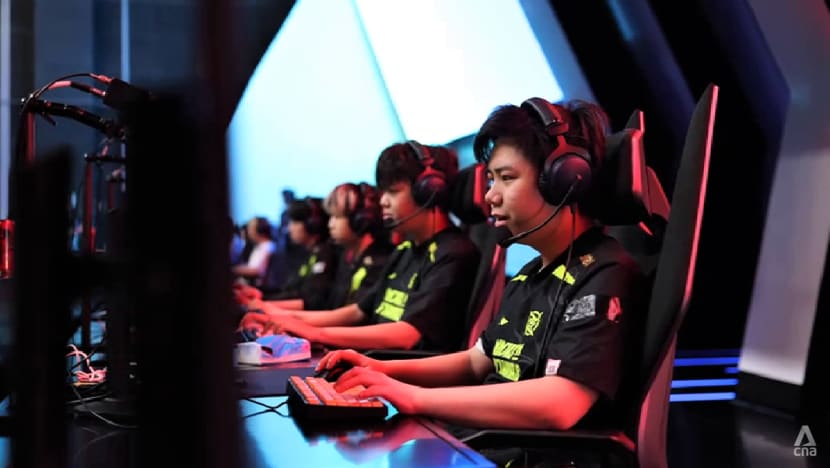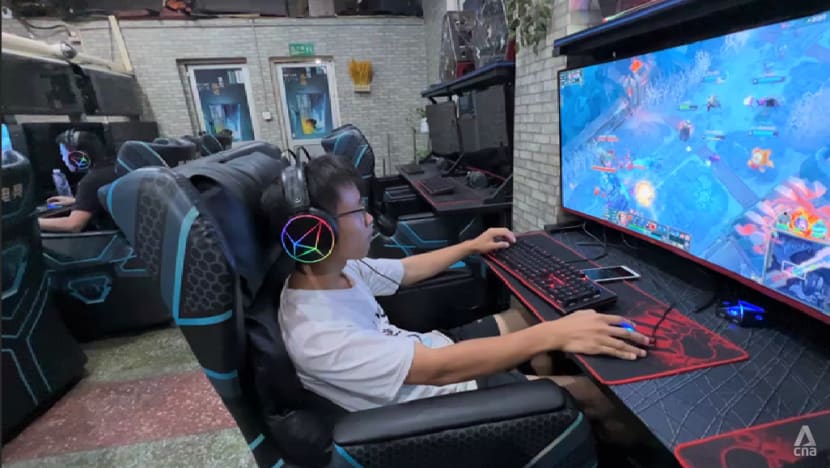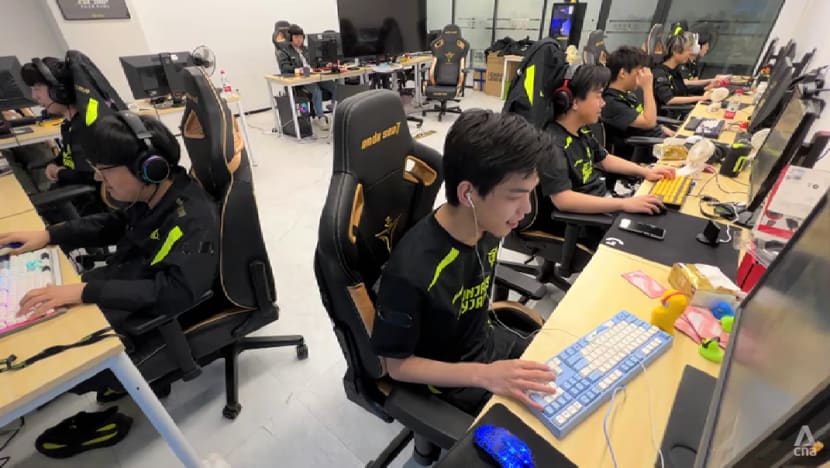China's e-sports potential grows, with degree courses and hotels catering to lucrative market
E-sports is making a historic medal debut at the ongoing Asian Games in Hangzhou.

China is home to some of the top-ranked players and largest e-sports companies globally.
SHENZHEN: Growing up, Mr Zhao Zhiqiang did not like studying and instead spent much of his time on computer games. Six years ago, he became a professional e-sports player.
“I realised that I am pretty good at it,” said the 22-year-old. “That's when I decided to turn pro.”
A typical day for him starts at 1pm. He plays on the computer for four hours before breaking for dinner with his team. Then, he continues training until 3am.
E-sports is taking off fast in China, which has cemented itself as a leader in game development over the last decade.
The world’s second largest economy is home to some of the top-ranked players and largest e-sports companies globally. China now has 487 million e-sports gamers, according to the China E-sports Industry Report from January to June 2023.
TURNING E-SPORTS INTO A PROFESSIONAL INDUSTRY
Now, the government wants to turn e-sports into a professional industry, leveraging on its strong potential to drive growth.
For the first time, e-sports featured as an official medal sports event at the ongoing Asian Games, which is being held in the Chinese city of Hangzhou.
China is now the biggest market in the world for video games, and the Asian Games debut is expected to give this market a further boost.
Analysts said the e-sports industry is developing on a similar trajectory as other traditional sporting games such as football and basketball.
"Similar to other professional sports, the top ranking e-sports players would demand very high club transfer fees, costing millions of dollars,” said Mr Zeng Xiaofeng, vice president at Niko Partners, a market research firm covering video games and e-sports.
“For an ordinary player, you may directly scout, trade, buy, and sell in the listing market. Of course, you can also do some youth training, and you can train players from a young age."

Niko Partners projects the total market for personal computer, mobile, and console games revenue to hit US$57 billion in 2027, up 25 per cent from the US$45 billion last year.
STRONG DEMAND FOR TALENT
As the industry matures, there will be a strong demand for skilled talent, noted observers.
Besides drawing a salary from the e-sports clubs they represent, players can earn from lucrative sources of income such as tournament prize money, corporate sponsorships, endorsement deals, and audience tips from livestreaming.
"We need all kinds of talents, to organise tournaments, for content operations, and player management,” said market leader Tencent’s e-sports tournament head for Peacekeeper Elite Tiger Xu.
“In fact, there is always a strong and consistent demand, not only from the gaming manufacturers and tournament organisers like us. Every e-sports club and team also needs all kinds of talents to help their players become better and more professional.”

The involvement of the education scene in e-sports represents a positive turn of events in China.
UNIVERSITY COURSES ON E-SPORTS
In recent years, universities have started introducing courses to train students to cash in on the explosive growth.
In 2016, China’s Ministry of Education added e-sports and management into its list of permitted college majors.
"By devoting education to this field, it in fact creates a healthy and corrective effect on this misunderstood industry. E-sports is often negatively linked to a culture of addiction,” said Shanghai Sports College’s assistant professor in broadcasting Zhu Junhe.
“Many people want to get rid of that derogatory label. The state is also introducing many policies, such as addiction prevention policies, like limiting the playing time for minors. I think it's a comprehensive management process."
The college is also among the early movers to introduce a professional course on e-sports commentary, he said.
“This is partly due to the global influence of e-sports, its rapid industry development, and Shanghai’s plan to become a global e-sports capital,” he added.
“So, with these factors in mind, we feel that this field definitely needs specialised talents and an education pipeline.”
Shanghai Sports College undergraduate Zhou Qiwei became interested in becoming an e-sports commentator after watching China win its first League of Legends World Championship in 2018.
“The moment we won the championship, many young people like me were all in a state of ecstasy, shouting in jubilation,” said Mr Zhou, who enrolled in an undergraduate programme with a major in e-sports commentary two years later when the opportunity came up.
“I was so excited that I couldn't describe it in words. I was overwhelmed just by listening to the commentator on stage, I wondered if I could ever become such a strong commentator.”
OVERCOMING “SPIRITUAL OPIUM” STEREOTYPE
Insiders hope the debut of e-sports as a medal event at the Asian Games would help legitimise the sector and reduce the stigma attached to the virtual sport.
For years, the e-sports industry has found it difficult to shake off the negative connotation with gaming addiction among youth.
In China, gaming is often seen as a form of “spiritual opium”. As early as 2000, the government had banned video game consoles.
But internet cafes then popped up all over China, with many having their own resident teams. At its peak in 2016, there were more than 150,000 internet cafes across the country.
By 2020, that number dropped by 40 per cent, after the government imposed strict regulations to tackle gaming addictions.
Still, the gaming industry continues to thrive.
Now, minors below 18 are not allowed to enter internet cafes. They are also limited to playing only three hours a week.
Niko Partners’ Mr Zeng said: “With this regulation, youth under the age of 18 simply can't play much games, which really has a great impact (on e-sports), especially on the professional training of teenage players.”
Some cyber cafes have found a way to skirt the age restriction by installing beds and transforming themselves into accommodation facilities.
Industry reports show the number of these e-sports hotels have doubled over the past year.
Mr Cha Qi opened his first e-sports hotel in 2019, and has since expanded his business to 53 outlets in the past four years using the same operating model.
His goal is to establish an outlet in 100 cities across China.

"In an e-sports hotel, you can have three to five friends play together for two or three days, just like you’re on a vacation,” said Mr Cha, chief executive officer of Yue Ta H E-Sports Hotel.
“Everyone eats together, bunks together, sleeps in the same room, fostering a kind of brotherhood. This is something an internet cafe is unable to provide.”
These hotels are not allowed to receive underage guests who come alone, said insiders. But oftentimes, they could use another person’s identification card, or just come with older friends if they are below 18.
This presents a legal grey area that the government has yet to crack down on.
“Shenzhen, Guangzhou, Beijing, Shanghai, and many provincial municipalities have introduced policies to support the upgrading of the e-sports industry,” said Mr Cha.
“This industry can be a strong economic driver for the country.”
Catch the 19th Asian Games Hangzhou 2022 LIVE with 6 dedicated channels on mewatch. Sign in now at mewatch.sg/asiangames to catch all the action for FREE, or catch highlights on Mediacorp Entertainment on YouTube.



















